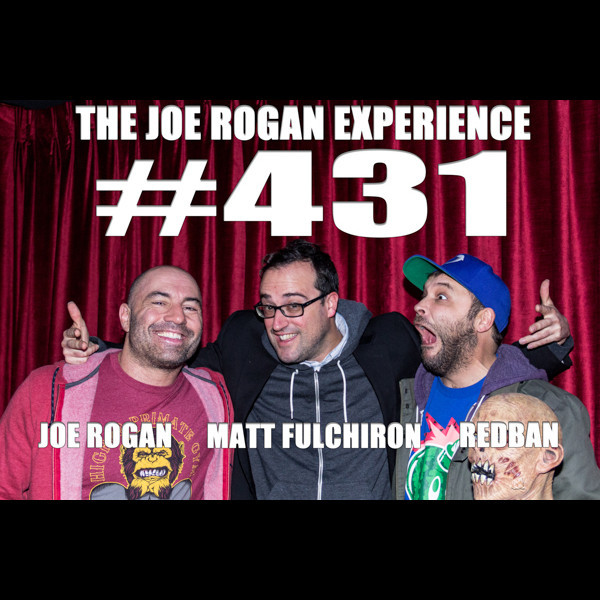12/19/2013
This podcast features Matt Fulchiron, a stand-up comedian and host of “The Full Charge Power Hour,” joining Joe Rogan for a lively conversation. While the episode is brimming with humor, it also delves into a variety of thought-provoking topics, raising questions about the nature of comedy, the entertainment industry, and human behavior.
- The Art of Comedy: Fulchiron explores the dynamics of stand-up comedy, revealing the importance of originality and honesty in the art form. He emphasizes that stand-up comedians rely on their own experiences and unique perspectives, making the concept of selling or buying an act particularly jarring. The discussion delves into the thin line between homage and plagiarism, highlighting the potential for creative inspiration while still maintaining artistic integrity.
- Fulchiron’s perspective on the sacredness of original material in stand-up comedy.
- The unusual practice of comedians selling their acts and the potential implications for artistic originality.
- The importance of camaraderie and mutual support within the stand-up community.
- The ethical considerations of utilizing outside writers and the collaborative nature of comedy.
- The Entertainment Industry: The podcast dives into the inner workings of television production, shedding light on the demanding hours, pressure-filled environments, and sometimes questionable practices prevalent within the industry. Fulchiron contrasts the creative freedom he experienced on “NewsRadio” with the stifling control he witnessed on “Hardball,” highlighting the stark difference between nurturing creative environments and profit-driven ones.
- The contrasting experiences of working on “NewsRadio” and “Hardball,” illustrating the impact of production environments on creative output.
- The often-grueling working hours in television production, including the challenges faced by crew members.
- The influence of network executives and producers on creative decisions and the potential for creative clashes.
- The allure and perils of sitcom fame and the transition from stand-up comedy to television acting.
- Human Behavior: The discussion delves into the motivations behind human actions, examining the allure of addiction, the pursuit of fame, and the nature of obsessions. Fulchiron explores the dangers of unchecked ambition and the pressure to conform to societal expectations, highlighting the need for self-awareness and authenticity.
- The dangers of addiction, particularly in the context of smoking and the addictive nature of habits.
- The complexities of fame and the impact it can have on an individual’s identity and behavior.
- The allure of obsessions and the ways in which individuals can become consumed by specific interests.
- The importance of self-acceptance and the challenges of navigating societal pressures and expectations.
- The Power of Nostalgia: The podcast features a nostalgic trip down memory lane, revisiting iconic moments from the past. Fulchiron shares anecdotes from his early stand-up days, reflecting on the impact of figures like Bill Hicks and George Carlin. The discussion delves into the power of time capsules and the enduring influence of cultural touchstones.
- The impact of Bill Hicks on the landscape of stand-up comedy and his enduring influence on contemporary comedy.
- The significance of nostalgia and the ways in which past experiences shape our present perspectives.
- The importance of recognizing cultural touchstones and the way they become embedded in our collective memory.
- The power of movies and television shows to transport us to different time periods and cultures.
- The Future of the World: Fulchiron touches upon the futuristic predictions of the past and the way those visions have shaped our present reality. The discussion includes a lighthearted exploration of the Monsanto House of the Future and the Flying Saucer house, highlighting the enduring fascination with the unknown.
- The fascinating juxtaposition between futuristic predictions from the past and our current technological advancements.
- The enduring fascination with the future and the desire to imagine what lies ahead.
- The intriguing connection between architecture and cultural trends, particularly in the context of futuristic designs.
- The role of technology and innovation in shaping our perceptions of the future.
Memorable Quotes
- “Guys say they don’t give a fuck, but they give a fuck. Everybody gives a fuck, man. I always give a fuck. I give a fuck. I give a fuck right now.” – Fulchiron’s candid admission about the human need to care about things.
- “Bill Hicks did not give a fuck, man. I’m really I saw the first guy in my life that didn’t honestly didn’t give a fuck on stage when I saw him.” – Fulchiron’s admiration for Bill Hicks’ fearless and uncompromising approach to comedy.
- “You know it’s good when not even Martin Scorsese says he can top it.” – Fulchiron acknowledges the unparalleled quality of some movies, like “The Godfather,” that have stood the test of time.
- “Human beings are begging for the aliens to fucking wipe us out. Bagging. With every new fashion choice, with every new video we make.” – Fulchiron’s humorous take on the absurdity of some current fashion trends.
- “Bruce Lee owns that fucking yellow jumpsuit. There’s never been like a time like that where someone has just a really standard type of athletic apparel that is so common to them that when you see it, all you think about is them.” – Fulchiron’s playful observation about the enduring association between Bruce Lee and his signature yellow jumpsuit.
